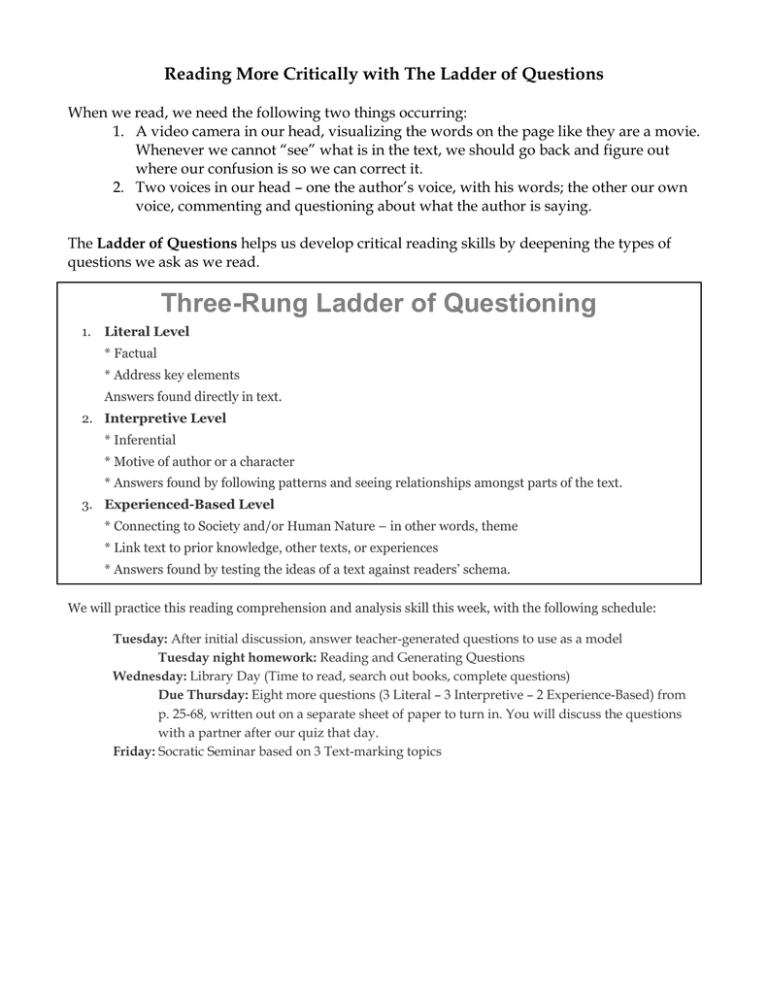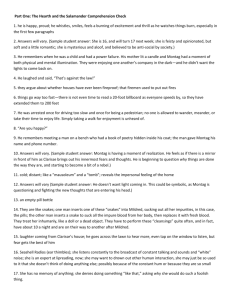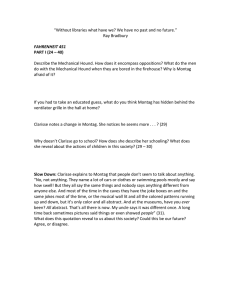Fahrenheit 451 Ladder of Questions
advertisement

Reading More Critically with The Ladder of Questions When we read, we need the following two things occurring: 1. A video camera in our head, visualizing the words on the page like they are a movie. Whenever we cannot “see” what is in the text, we should go back and figure out where our confusion is so we can correct it. 2. Two voices in our head – one the author’s voice, with his words; the other our own voice, commenting and questioning about what the author is saying. The Ladder of Questions helps us develop critical reading skills by deepening the types of questions we ask as we read. Three-Rung Ladder of Questioning 1. Literal Level * Factual * Address key elements Answers found directly in text. 2. Interpretive Level * Inferential * Motive of author or a character * Answers found by following patterns and seeing relationships amongst parts of the text. 3. Experienced-Based Level * Connecting to Society and/or Human Nature – in other words, theme * Link text to prior knowledge, other texts, or experiences * Answers found by testing the ideas of a text against readers’ schema. We will practice this reading comprehension and analysis skill this week, with the following schedule: Tuesday: After initial discussion, answer teacher-generated questions to use as a model Tuesday night homework: Reading and Generating Questions Wednesday: Library Day (Time to read, search out books, complete questions) Due Thursday: Eight more questions (3 Literal – 3 Interpretive – 2 Experience-Based) from p. 25-68, written out on a separate sheet of paper to turn in. You will discuss the questions with a partner after our quiz that day. Friday: Socratic Seminar based on 3 Text-marking topics Three Levels of Questions from Fahrenheit 451 (p. 1-24) Literal 1. At the beginning of the story, how does Montag feel about his job? Give specific examples to support your response. 2. How does Mildred react when Montag tells her what happened the night before? 3. Why does Mildred want a 4th television for the 4th wall in their house? 4. Why is the conversation about the 200-foot billboards significant? What is Bradbury implying about this society? 5. Why do you think the “Are you happy?” question affects Montag so much? What other evidence suggests that Montag is beginning to question his existence? 6. On p. 24, Montag opens his mouth towards the sky after Clarisse leaves. What does this reveal about Clarisse’s influence on him? On Montag’s state of mind? Interpretive Experienced-Based 7. After her overdose, the men treat Mildred almost like she is an automobile that needs a tuneup instead of a person, and this upsets Montag. With this incident, what is Bradbury warning about technological advances in medicine? Do you think any of these ideas have come true? 8. Mildred wears little “electronic bees” in her ears most of the time, and desires a 4 th wall-TV to be put in. Right after this conversation, Montag escapes outside to natural elements like rain, dandelions, and a faceto-face conversation with another person (Clarisse). Are people in today’s society – as in this one that Bradbury describes -- using technology as a way to separate themselves from other people? What connections can you make between Bradbury’s futuristic view of society and our own?



